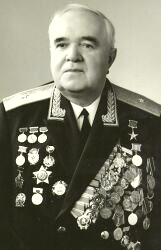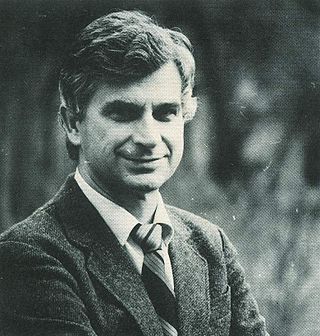
The State Anthem of the Union of Soviet Socialist Republics was the national anthem of the Soviet Union and the regional anthem of the Russian Soviet Federative Socialist Republic from 1944 to 1991, replacing "The Internationale". Its original lyrics were written by Sergey Mikhalkov (1913–2009) in collaboration with El-Registan (1899–1945), and its music was composed by Alexander Alexandrov (1883–1946). For a two-decade interval following de-Stalinization, the anthem was performed without lyrics. The second set of lyrics, also written by Mikhalkov and in which Stalin's name was omitted, was adopted in 1977.

Alexander Vasilyevich Alexandrov was a Soviet and Russian composer and founder of the Alexandrov Ensemble, who wrote the music for the State Anthem of the Soviet Union, which in 2000 became the national anthem of Russia. During his career, he also worked as a professor of the Moscow Conservatory, and became a Doctor of Arts. His work was recognized by the awards of the title of People's Artist of the USSR and two Stalin Prizes.

The Alexandrov Ensemble is an official army choir of the Russian armed forces. Founded during the Soviet era, the ensemble consists of a male choir, an orchestra, and a dance ensemble.
"Song of the Plains", also known as "Meadowlands", "Cavalry of the Steppes" or "O Fields, My Fields", is a Soviet Russian song. In Russian, póle (поле) means 'plain', and pólyushko (полюшко) is a diminutive and hypocoristic form of póle.
"Kalinka" is a Russian folk-style song written in 1860 by the composer and folklorist Ivan Larionov and first performed in Saratov as part of a theatrical entertainment that he had composed. Soon it was added to the repertoire of the folk choral group. Since the end of World War II, the song has been popularized by Alexandrov Ensemble, the official army choir group of the Russian Armed Forces.

The Turetsky Choir is a Russian men's a cappella ensemble and musical collective under the direction of Mikhail Turetsky. Their voices range from tenore contraltino to basso profundo.

Georgy Pavlovich Vinogradov was a Soviet and Russian tenor: a popular World War II singer on Radio Moscow, recording artist, and soloist with the Alexandrov Ensemble. Honored Artist of the RSFSR (1949).

Evgeny Mikhailovich Belyaev was a Russian tenor soloist of the Alexandrov Ensemble under Boris Alexandrov. He is remembered in the Soviet Union as the Russian Nightingale and in the West as one of the definitive singers of Kalinka.
This is a list of recordings made by the Alexandrov Ensemble since 1928. Within each section they are in alphabetical order of record labels.

Boris Alexandrovich Aleksandrov was a Soviet and Russian composer and, from 1946 to 1986, the second head of the Alexandrov Ensemble which was founded by his father, Alexander Vasilyevich Alexandrov. Aleksandrov reached the rank of Major-General and was awarded the order of Hero of Socialist Labour, the Lenin and Stalin Prize, and named People's Artist of the USSR.

Vladimir Bunchikov was a Soviet baritone and Honoured Artist of Russia (1944). In Simferopol he was a scenery operator at the Drama Theatre. After graduating from the Dnepropetrovsk Music College, he studied in Leningrad. From 1929 he was a soloist at the Opera in Dnepropetrovsk, and from 1931 at the Nemirovicha-Danchenko Musical Theatre in Moscow.

Victor Ivanovich Nikitin,(Russian: Виктор Иванович Никитин), was a Soviet tenor soloist of the Alexandrov Ensemble, born in Syzran 12 February 1911 and died in Moscow 6 January 1994. He is notable for being the first Mr Kalinka, and for being called "Ambassador Kalinka" by Erich Mückenberger after singing at the 1948 Berlin peace concert. He was buried at Pyatnitskoye cemetery in Moscow.

Leonid Mikhailovich Kharitonov was a Soviet and Russian bass-baritone singer. He was honored with People's Artist of the RSFSR and Honored Artist of RSFSR. In the West he was noted for his 1965 video of The Song of the Volga Boatmen.

"V putj" is a song written in 1954 by Soviet composer Vasily Solovyov-Sedoi and poet Mikhail Dudin. It was originally written for the film Maksim Perepelitsa starring Leonid Bykov. The movie itself was released in 1955, and the song has achieved fame and popularity independently of it ever since. To this day it is still used as a so-called drill song. In 1959, Vasily Solovyov-Sedoi received the Lenin Prize for this song.
"My Army" is a Soviet marching song written in the Russian language, performed by the Alexandrov Ensemble. The lyrics were written by Soviet musician and composer Rafael Moritsovich Plaksin. The music was composed by prolific Soviet composer Aleksandr Aleksandrovich Abramov, in 1970.

Artur Arturovich Eizen, was a Soviet and Russian bass singer, actor and pedagogue. People's Artist of the USSR (1976).
The "Song of the Soviet Army", also known as the "Song of the Russian Army" or by the refrain's opening line "Invincible and Legendary", is a Soviet patriotic song written during the end of World War II. Its performance has been done by numerous artists, especially by the Alexandrov Ensemble. The original 1945 version is triumphal in tune, with its brass fanfares and ecstatic chords extended upward with the aid of trumpets, as part of the V-E Day celebrations. That arrangement by A. Alexandrov is very much in the tradition of final choruses in 19th-century Italian grand opera, and shows how he originally envisaged this composition. There are many versions of the song.

Anatoliy Borysovych Solovianenko was a Ukrainian operatic tenor, People's Artist of the USSR (1975), People's Artist of Ukraine, and State Taras Shevchenko prize-winner.
The March of the Defenders of Moscow or the Song of the Defenders of Moscow is a Russian military march originally used by the Red Army and appeared first during the 1941 Battle of Moscow. The words to the march were written by Alexey Surkov while the music was composed by Boris Mokrousov. In early October 1941, the Wehrmacht began their offensive to take control of Moscow. In shock, Surkov composed a poem he titled Defenders of Moscow. The poems were first published in the newspaper of the Krasnoarmeiskaya Pravda on 3 November 1941. A week later, it was printed by Vechernyaya Moskva. Drawing the attention of the Central Studio of Documentary Film of USSR, the text was set to music by Mokrousov and was broadcast in a documentary on the defense of the cities of Volokolamsk and Mozhaysk. It was later performed in an orchestra setting in the 1942 Soviet film, Moscow Strikes Back. It was also used in the 1944 film Six P.M..

















